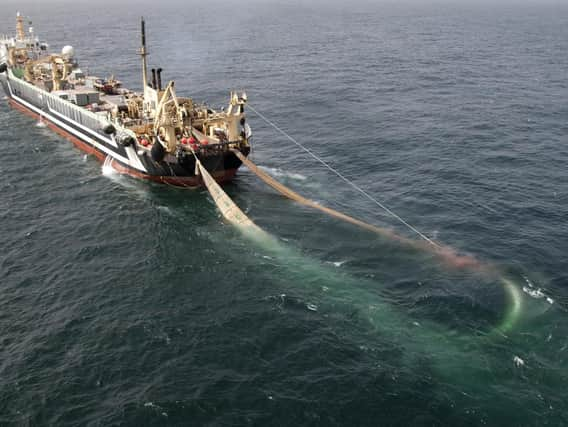Concerns raised after supertrawler spotted off Portsmouth coast


Lithuanian-registered Margiris fishing boat – once considered the second largest in the world – has been seen between Portsmouth and Sussex over the past few days, according to MarineTraffic.
Currently, it is not believed to have caught any fish.
The vessel, which has a deadweight of 6,200, was banned from fishing in Australian waters in 2013.
Advertisement
Hide AdAdvertisement
Hide AdNow, the concern is that Portsmouth fishermen could suffer if the vessel’s nets are cast, as the 142-metre long vessel may catch mackerel and sea bass, the latter of which is already overfished.
A spokesman for the Blue Planet Society said: ‘The capacity of these trawlers is equivalent to dozens of small-scale fishing vessels, and sustainable small-scale fisheries cannot compete with industrial supertrawlers.
‘Supertrawlers are effectively floating factories and able to stay at sea for considerable periods of time. Margiris can process 250 tonnes of fish per day whilst at sea.
‘We think the supertrawlers Margiris and Annie Hillina are targeting mackerel off Sussex. This will undoubtedly put them in contact with short-beaked common dolphins, endangered bluefin tuna and overfished sea bass.’
Advertisement
Hide AdAdvertisement
Hide AdClive Fennell, who lives in Littlehampton in West Sussex and runs the Littlehampton Environment and Places Facebook page, said: ‘Like with all environmental issues many people are very concerned, and worry about the future.’
Margiris is owned by Dutch company Parlevliet van der Plas, which says it has an ‘excellent reputation for sustainable fishing’.
The firm’s website says that its catch quotas ‘are dictated by government and EU regulations, and are based on scientific advice.’
Advertisement
Hide AdAdvertisement
Hide Ad‘We fish without causing damage to the seabed, and without disturbing the ecological system,’ it adds.
The Marine Management Organisation, which also has an office in Portsmouth, has been contacted by The News for comment.
If there is a story you think we should know about, you can contact us via our email [email protected] or via our social media channels – Facebook or Twitter.